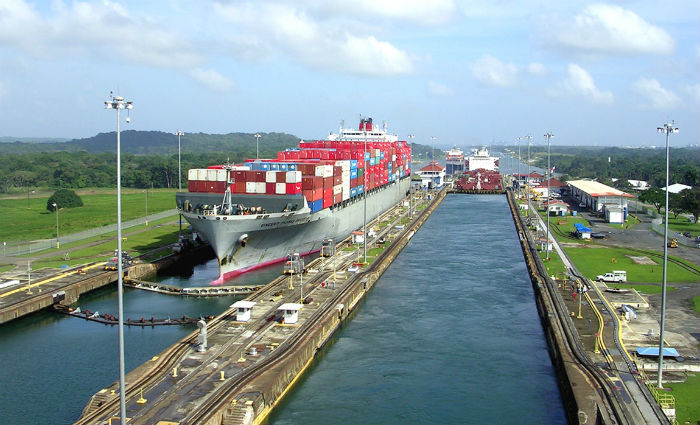If you are shipping from Asia to the U.S. East Coast, there is a good chance your cargo has been rerouted. The reroute, which switches cargo vessels from traveling via the Panama Canal to now traveling via the Suez Canal, is a result of cost savings that can be achieved by doubling cargo loads on larger vessels.
Last month, Maersk Line, the Panama Canal’s top customer, announced it would reroute services to the Suez Canal until the 2015 Panama Canal expansion allows the much larger Post-Panamax vessels to realize cost savings per twenty-foot equivalent unit, or TEU, through Central America.
APL, the container shipping unit of Singapore’s Neptune Orient Lines (NOL), has announced three new services that would have previously been thought to travel via Panama to the Suez Canal., citing profitability.
The Panama Canal will lose roughly $40 million dollars in revenue alone this year as a result of the changes; however, the revenue loss will be offset after the $5.25 billion expansion that will offer “a larger third lane will fit ships 1,200 feet (365 meters) long and 50 feet (15 meters) deep and carrying nearly three times as many containers,” according to Reuters.

So, what are the differences between the two canals?
Ship Size: The Suez Canal can carry almost double the load than a ship going through the Panama Canal. For example, a ship going from Hong Kong to New York-New Jersey going through the Panama Canal can hold 4,800-TEUs, while a ship traveling through the Suez Canal can hold 8,000-TEUs.
Transit time: From Hong Kong to New York-New Jersey, Panama routing takes 26 days versus 27 days via Suez at non-stop transit at 18 knots; however, due to routing, stops and other factors, Reuters approximates that each ship takes “11 days longer” for total transit time.
Cost Savings Per TEU: For a ship traveling from Hong Kong to New York-New Jersey on a 4,800-TEU ship the cost per TEU is $1,250USD compared to the same routing on an 8,000-TEU ship through the Suez at $850USD per TEU.
Tolls on Fully Loaded 4,800-TEU Container Ship: When comparing apples to apples on the same fully loaded TEU count vessel, Panama charges roughly $450,000USD versus Suez’s $489,600USD. Shipper should note that while this figure represents a $4,800-TEU ship, the Suez Canal can house 8,000-TEU containers.
Method of Transit: In the Panama Canal, ships are ushered through a series of locks. According to the Journal of Commerce, “It takes 8 minutes to fill a lock chamber with 101,000 cubic meters of water. An average of 52 million gallons of fresh water are used in each ship transit.” For the Suez Canal, each container vessel must travel in a convoy of ships at set speed and distances with the help of contracted canal pilots. Only three convoys depart daily in the Suez Canal.





4 Comments on “Asia-US East Coast Ocean Freight Reroute- Suez Versus Panama”
I am genuinely thankful to the holder of this web page who has shared this fantastic
paragraph at here.
We are glad you’ve enjoyed our page.
Thank you for the information but WHY the tiny sans serif type in light grey? Why is this now fashionable? As a lifetime graphic designer, I always keep my intended audience in mind. I find this choice of text really difficult to read and ugly to look at.
Hi Loris – Thank you for reading us.
Which font you suggest we should update our blog with? perhaps a Helvetica?